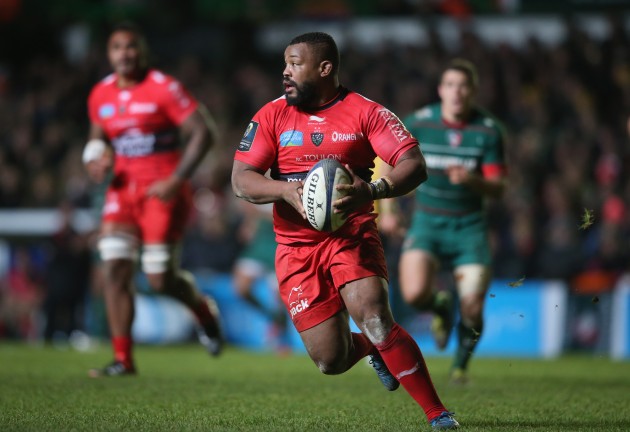Will there be an exodus of biblical proportions from England if the exceptional circumstances rule was relaxed? Our French expert doesn't think so...
One of the more persistent arguments peddled in the Steffon Armitage selection saga is the one about ‘floodgates opening’. That should England coach Stuart Lancaster invoke the ‘exceptional circumstances’ clause and select the Toulon flanker in his World Cup squad, then before you could say ‘au revoir’, many of England’s finest would be surfing across the Channel on a wave of wonga.
It’s a line of argument that demands closer scrutiny. So let’s start with the French clubs: are they falling over themselves to sign up the English? The short answer is ‘no’. One rugby agent told me last week that while the Top 14 clubs might be interested in a fly-half or a tighthead prop, in other positions they are more than adequately covered, particularly as none of this current England squad is in the world-class bracket.
After a series of high-profile disappointments in recent seasons – Dan Lydiate, Gethin Jenkins and Jim Hamilton, to name but three – the French clubs are more circumspect about signing Home Nations’ players, preferring those from the Southern Hemisphere.

Troubled times: Jim Hamilton was one of a handful of international stars who didn’t settle in France
Additionally, each player who comes to France has to be the ‘right fit’, the expression used by Pau head coach Simon Mannix when we discussed his recruitment policy last month. Similar sentiments have also been expressed to me this season by three other Top 14 coaches in discussing overseas signings. Clubs research the career of any potential big-money recruit, seeking advice from former teammates and coaches as to his character and attitude. It’s one reason why this generation of Toulon stars has been so successful, because the club diligently identified the players who were the right fit, having made mistakes in the past with the likes of Victor Matfield, Anton Oliver and Gavin Henson.
How many of the current England squad are the ‘right fit’ for a French club? There has never been much affinity between England’s top players and French clubs, and in the last 15 years only a trickle have crossed the Channel, many in the autumn of their careers: the likes of Jonny Wilkinson, Jamie Noon, Iain Balshaw and Andrew Sheridan. That quartet thrived in France because they had the breadth of mind, the maturity and the intelligence to embrace the differences in rugby and culture. But for every Englishman who’s made a success of his time in France, there’s a Riki Flutey, Shane Geraghty, Paul Sackey or Ollie Smith.
But even if a French club were to table an offer to an English player, would it really be so superior to what he’s already earning in the Premiership? The agent to whom I spoke said that a few of Stuart Lancaster’s squad are on “massive deals” and while one or two French clubs would have the means to better their Premiership wages, it is unlikely to be substantial enough to lure the players out of the comfort zone of their very professional environment, where all their needs are catered for.
In fact there’s a growing feeling in France, articulated by Midi Olympique last month, that the era of Top 14 dominance in the transfer market may be drawing to a close. As the paper pointed out, the influx of overseas stars to France really took off in the wake of the 2007 World Cup. The tournament, hosted superbly by France, captured the imagination and also coincided with the start of Mourad Boudjellal’s project at Toulon. Could something similar happen in England after this year’s World Cup? Midi Olympique, with its well-placed sources, clearly believes it could, warning that far from the English flooding over to France in the coming years, “we could very quickly see the inverse and the French internationals traversing once more the Channel as was the case in the early 2000s.”
A recent report from [2] DNACG, French rugby’s financial gendarme, revealed that the cumulative deficit of the Top 14 clubs for 2013-14 was €33.9m, of which 75% was incurred by Stade Francais, Racing Metro and Castres (the two Parisian clubs have taken a financial hit because Stade spent €95m redeveloping their Jean Bouin ground while Racing’s state-of-the-arena Arena 92 – which opens next year – is costing €350m). With Toulouse allegedly set to slash their budget for next season by as much as €5m because of financial difficulties, the overall picture painted by the report was not healthy with Toulon and Brive the only two Top 14 clubs in 2013-14 to post a profit.
So the talk of ‘floodgates opening’ is just scare-mongering on the part of those who selfishly oppose Lancaster selecting Armitage in his World Cup squad. A shame, because Armitage would not only enhance the quality of the England squad, but think of all the inside information he could provide on Matt Giteau and Drew Mitchell, a pair so talented that they must be licking their lips at the prospect of testing the current England back-row, unbalanced as it is, on October 3.







